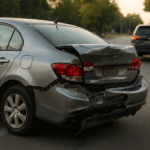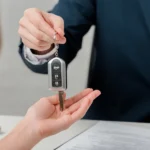What to Do If You're At Fault in a Car Accident: A Guide from a Car Accident Lawyer
Being involved in a car accident is stressful enough, but realizing that you’re at fault adds an additional layer of worry. Knowing what to do if you’re at fault in a car accident is essential for protecting yourself legally and financially. A car accident lawyer can help you navigate this complex process and ensure that you’re taking the necessary steps to minimize the consequences.
It is important to learn what you should do if you’re at fault, the potential consequences, how states determine fault, and steps you can take to prevent future accidents.
Consequences of Being At Fault in an Accident
In an automobile accident, being found at fault can have several repercussions:
Financial Liability
If you’re found liable for the accident, your insurance will cover the other party’s damages, including vehicle repairs, medical expenses, and possibly lost wages. If the total damages exceed your policy limits, you could be held personally responsible for the difference. It is essential to understand your car insurance policy and discuss options with a car accident lawyer for personalized car insurance legal advice.
Increased Insurance Premiums
If you are deemed at fault, your insurance premiums will likely increase. The extent of the hike depends on the severity of the accident, your insurance policy, and your driving history. Consulting a lawyer for car crash legal advice can help you navigate the insurance process effectively and avoid common pitfalls.
Legal Consequences
In extreme circumstances, like collisions with serious injuries or fatalities, the other party might sue. Having a car accident lawyer represent you can help mitigate these legal consequences and protect your rights. Understanding car collision law is crucial for navigating the complexities of such cases and ensuring you are not unfairly penalized.
Points on Your Driving Record
Many states assign points to your driving record if you’re found at fault in an accident. Accumulating too many points can lead to license suspension, higher insurance premiums, or mandatory driving courses. It’s vital to seek auto accident recovery support to manage the repercussions on your driving record and insurance rates.
Important Car Accident Laws
Understanding some key car accident laws can help protect your rights:
- Comparative Negligence Laws: Some states follow a comparative negligence system, which means even if you are partially at fault, you may still receive compensation, but it will be reduced by your degree of fault.
- Contributory Negligence Laws: In some states, if you are found to be even slightly at fault, you may not receive any compensation.
- Failure to Report an Accident: Not reporting an accident can lead to fines, legal issues, and even penalties on your insurance. Always report accidents promptly to avoid complications.
How States Determine Fault
The way fault is determined varies by state. Some states follow a pure comparative negligence system, meaning even if you are partially responsible for the accident, you may still be eligible for compensation, though your recovery will be reduced by your degree of fault.
In jurisdictions where contributory negligence laws are in effect, you might not be able to get any compensation at all if you are judged to be even somewhat at fault. Many states, however, follow a modified comparative negligence system, which allows you to recover damages if your fault percentage is below a certain threshold (typically 50-51%).
It is essential to comprehend how your state determines faults. A car accident lawyer can guide you through the specific regulations and help ensure you’re not unfairly blamed.
What Happens If You Get Insurance After an Accident?
Your new insurance will not cover an incident that has already happened if you were uninsured at the time of the accident and then attempted to obtain coverage. This situation could leave you liable for all costs associated with the accident.
It is illegal in most states to drive without insurance, and penalties can include fines, license suspension, and even jail time. Always ensure that you have valid insurance before driving to avoid these consequences.

What Needs to Be Done?
So, here is what to do if you’re at fault in a car accident.
Stay Calm and Assess the Situation
Following the collision, it’s critical to maintain your composure. Your first priority should be safety. Check for wounds and call emergency services if necessary. Even if you believe you’re at fault, your immediate concern should be ensuring that everyone involved is safe.
Once safety is addressed, remain composed and follow the necessary steps without panicking.
Don’t Admit Fault
One of the most important things to remember when it comes to at fault accidents is not to admit fault on the scene. Even if you feel you’re at fault, liability can be complex and determined by multiple factors, including road conditions, vehicle malfunctions, or the actions of other drivers. Admitting fault too early can complicate insurance claims and legal proceedings.
Your car accident lawyer can later help you navigate the legal process to determine fault and provide you with car crash legal advice tailored to your situation.
Gather Information and Evidence
It is important to obtain as much information as you can, even if you believe you have something to do with the disaster. Ask everyone involved for the following details:
- Names, locations, and phone numbers for those in contact
- Driver’s license and insurance details
- Details about the vehicle (make, model, and license plate number)
- pictures of the accident scene, the state of the roads, and vehicle damage
- Contact information of any witnesses
Collecting this evidence is crucial for both your insurance claim and your defense in case of legal proceedings.
Notify Your Insurance Company
Regardless of fault, you must inform your insurance company about the accident. Here are the steps to follow:
- Review Your Policy:Recognize your coverage and the details your insurer needs.
- Report the Accident Promptly: Many policies have time limits for reporting accidents. Failing to report on time could result in a claim denial.
- Provide Basic Details: Stick to the facts about the accident. Avoid making statements that imply fault.
- Submit Necessary Documentation: Provide photos, contact information, and a copy of the police report if available.
- Follow Up: Keep in touch with your insurance company to track the progress of your claim and respond to any requests for additional information.
Accurate reporting and following your insurer’s guidelines are vital to avoid issues with your claim.
Preventing Future Accidents
While it’s impossible to predict every scenario on the road, you can take steps to prevent being at fault in an accident:
- Practice Defensive Driving: Stay alert, anticipate potential hazards, and avoid aggressive driving behaviors.
- Avoid Distractions: Refrain from distractions like texting or eating while driving and keep your focus on the road.
- Maintain Your Vehicle: By keeping your car’s tires, brakes, and lights in good working order, routine maintenance lowers the risk of mechanical issues that could cause collisions.
- Follow Traffic Laws: Adhering to speed limits, using signals, and respecting right-of-way rules reduces your chances of being involved in an accident.
By adopting these practices, you can lower the risk of future accidents and protect yourself and others on the road.
Contact Mokaram Law Firm for Help
Knowing what to do if you’re at fault in a car accident is critical, but having professional legal help can make a significant difference in protecting your rights and minimizing the consequences. A car accident lawyer will assess the situation, gather evidence, and work with insurance companies to ensure you’re treated fairly.
If you’ve been involved in an accident and are worried about the consequences of being at fault, the team at Mokaram Law Firm is here to help. Call us today at (281) 609-9224 for expert legal advice and representation to protect your interests and guide you through this challenging time.
FAQs
Will insurance fix my car if I’m at fault?
Yes, if you have collision coverage, your insurance will cover the cost of the repairs to your car, less your deductible, even if you are at fault. However, this can raise your premiums.
What happens after a car accident that is your fault?
If you are at fault, your insurance will pay for the losses incurred by the other party and maybe your own, based on your policy. You may face increased premiums, legal consequences, and points on your driving record.
Can you get compensation if the accident was your fault?
Typically, you cannot get compensation for your injuries if you are at fault. However, if you have personal injury protection (PIP) or medical payment coverage, these can help cover your medical expenses regardless of fault.
Recent Posts
-
 05 May 2025How Long Does a Misdemeanor Stay on Your Record?
05 May 2025How Long Does a Misdemeanor Stay on Your Record? -
 22 Apr 2025When Can Kids Sit in the Front Seat? Understanding Texas Car Seat Laws
22 Apr 2025When Can Kids Sit in the Front Seat? Understanding Texas Car Seat Laws -
 18 Apr 2025Is a Hit and Run a Felony? Understanding the Legal Consequences
18 Apr 2025Is a Hit and Run a Felony? Understanding the Legal Consequences -
 14 Apr 2025T-Bone Accidents: Who’s at Fault, Common Injuries, and What to Do Next
14 Apr 2025T-Bone Accidents: Who’s at Fault, Common Injuries, and What to Do Next -
 10 Apr 2025What Does Asbestos Insulation Look Like? Identifying Potential Risks in Your Home
10 Apr 2025What Does Asbestos Insulation Look Like? Identifying Potential Risks in Your Home -
 26 Mar 2025How Does a Car Accident Affect Lease Vehicles?
26 Mar 2025How Does a Car Accident Affect Lease Vehicles? -
 26 Mar 2025If I Get Injured at Work, Do I Get Paid? Understanding Workplace Injury Laws in Texas
26 Mar 2025If I Get Injured at Work, Do I Get Paid? Understanding Workplace Injury Laws in Texas -
 26 Mar 2025Is Reckless Driving a Felony? Understanding the Legal Consequences in Texas
26 Mar 2025Is Reckless Driving a Felony? Understanding the Legal Consequences in Texas -
 24 Mar 2025Can I Ride a Motorcycle at 13? Texas Motorcycle Laws Explained
24 Mar 2025Can I Ride a Motorcycle at 13? Texas Motorcycle Laws Explained -
 21 Feb 2025Is a DUI or DWI Considered a Felony?
21 Feb 2025Is a DUI or DWI Considered a Felony? -
 21 Feb 2025How Long Does a Speeding Ticket Stay on Your Record?
21 Feb 2025How Long Does a Speeding Ticket Stay on Your Record? -
 18 Feb 2025Delta Plane Crash at Toronto Pearson Airport: Bombardier CRJ900 Overturns
18 Feb 2025Delta Plane Crash at Toronto Pearson Airport: Bombardier CRJ900 Overturns



 English
English Español
Español